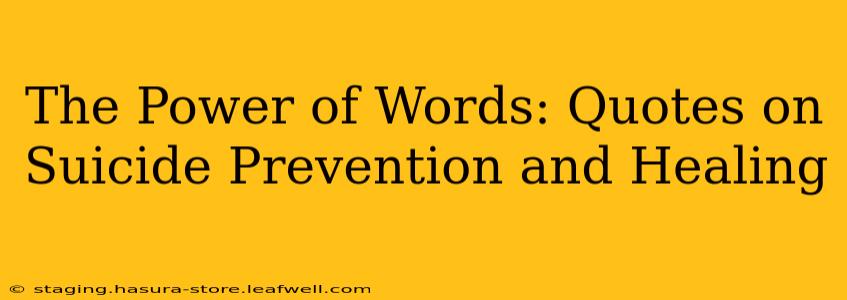Suicide is a complex issue, often shrouded in silence and stigma. But the power of words can be transformative, offering solace, hope, and a pathway towards healing. This article explores the profound impact of carefully chosen words in suicide prevention and recovery, using insightful quotes to illuminate the journey towards mental well-being. We'll delve into the importance of compassionate communication and the role language plays in fostering resilience and promoting help-seeking behaviors.
What are some helpful things to say to someone who is suicidal?
This is a crucial question, and the answer isn't a simple, one-size-fits-all phrase. Instead, focus on conveying genuine care and concern. Avoid clichés like "everything will be alright," which can feel dismissive. Instead, try phrases that validate their feelings and offer support without judgment. For instance, "I'm here for you," "I'm worried about you," or "Tell me what's going on." Active listening, showing empathy, and letting them know you're there to listen without judgment are paramount. Remember, offering to help them find professional help is vital.
How can I help someone who is thinking about suicide?
Helping someone contemplating suicide requires sensitivity and a willingness to engage. It's essential to encourage them to seek professional help. This can involve connecting them with a crisis hotline, therapist, or other mental health professional. Your role is to be a supportive presence, offering a listening ear and unwavering compassion. Don't try to fix their problems; instead, let them know you're there to support them through their struggles. Educate yourself on the warning signs of suicide and how to respond effectively. This might involve learning about available resources in your community or researching various mental health conditions.
What are some positive affirmations for suicide prevention?
Positive affirmations, when used thoughtfully, can be a powerful tool for building resilience and self-worth. Phrases like "I am worthy of love and belonging," "I am strong and capable," and "I am not alone" can help combat negative self-talk and foster a sense of hope. However, it's crucial to remember that affirmations are not a replacement for professional help. They should be used as a complement to therapy and other support strategies. It's essential to find affirmations that resonate personally and to repeat them regularly.
What are some quotes about hope and healing after a suicide attempt?
The path to healing after a suicide attempt is long and challenging, but hope remains a vital compass. Quotes that emphasize resilience, recovery, and the possibility of a brighter future can offer profound comfort and inspiration. For example, “The oak sleeps in the acorn; the bird waits in the egg; and in the highest vision of the soul a waking angel stirs. Dreams are the seedlings of realities.” – James Allen. This quote speaks to the inherent potential within each of us, even in the darkest moments. Other inspirational quotes focusing on personal strength and the capacity for growth can help individuals find renewed hope and motivation.
What are some resources for suicide prevention?
Several organizations provide invaluable support and resources for individuals contemplating suicide and their loved ones. The National Suicide Prevention Lifeline (988 in the US) offers immediate assistance, while organizations like the American Foundation for Suicide Prevention (AFSP) offer educational materials, support groups, and advocacy efforts. The Crisis Text Line (text HOME to 741741) provides 24/7 support via text message. It's crucial to be aware of the resources available in your local community, as these may vary from region to region.
Conclusion:
Words hold immense power in suicide prevention and the healing process. By using language thoughtfully, demonstrating compassion, and actively promoting help-seeking behaviors, we can create a supportive environment that fosters hope and resilience. Remember, seeking professional help is a sign of strength, not weakness. If you or someone you know needs help, please reach out to one of the resources listed above. Your life matters.

